
Free
Drama Lesson Plans for Teachers
Lesson plans
available on the Internet
A
to Z Teacher Stuff
A to Z Teacher
Stuff is a teacher-created site designed to help teachers find online
resources more quickly and easily. Find lesson plans, thematic units,
teacher tips, discussion forums for teachers, downloadable teaching
materials & eBooks, printable worksheets and blacklines, emergent
reader books, themes, and more.
TeachersPayTeachers.com
2 out of 3
teachers in the U.S. turn to TpT. Search from over 3 million free and
paid educator-created resources across grades, subjects, and
specialities that help deliver engaging, effective instructions to students.
Yale-New
Haven Teachers Institute
Drama For Those
Who Do Not Like Or Understand Drama. This curriculum unit is being
designed for a specific group of students. These students have
reading levels ranging from the third grade to the twelfth grade.
They will be either juniors or seniors, with average or below average
skills in English; including reading, writing and speech.
TeAchnology
Drama and Theatre Lesson Plans
For over a
decade, TeAchnology has been providing free and easy to use resources
for teachers dedicated to improving the education of today's
generation of students. We feature 46,000+ lesson plans. We are the
online teacher resource that is designed to help busy Kindergarten
through High School teachers.
KET:
Welcome to Drama Toolkit
Kentucky
Educational Television, Lexington, KY
This Drama
Toolkit provides K-12 teachers with high-quality teaching resources
that bring the excitement of the theater into the classroom.
You’ll find lesson plans, idea cards, glossaries, and many
special features. Some of these, such as Kentuckians in Theater, Tour
of the Stage, and Will Power, are designed for students as well as teachers.
Study.com:
World Literature Drama Lesson Plans
The World
Literature: Drama chapter of this course is designed to help you plan
and teach about the history and different elements of drama in your
classroom. The video lessons, quizzes and transcripts can easily be
adapted to provide your lesson plans with engaging and dynamic
educational content. Make planning your course easier by using our
syllabus as a guide.
KinderArt:
Drama Exercises for Kids
KinderArt makes
teaching art easier for teachers, parents and artists with art lesson
plans art curriculum and tips for all ages. We began KinderArt.com in
1997 because at the time, we saw a real need for FREE art lesson
plans that parents and teachers could try with their students and
children. Soon after, YOU began sharing your ideas too. And so it
continues today&ldots; 20 years later!
Story
of Japanese girl in WWII inspires art, history, theater lessons at
Jackson High
Ohio School
creates innovative program that involves all students
CantonRep.com -
The Repository - Canton OH
Surviving the
blast, the girl died 10 years later from leukemia.
During her
sickness, Sasaki embraced the ancient Japanese tradition of making a
thousand paper cranes because folklore says doing so will grant
someone a wish or bring them happiness.
Cranes are now
a symbol of peace in Japanese culture. The Children's Peace Monument
in Hiroshima stands for peace to commemorate Sasaki and other child
victims of the atomic bombing of Hiroshima.
"Freshmen
students led the curriculum-based endeavor."
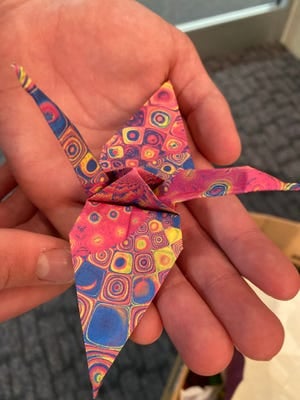
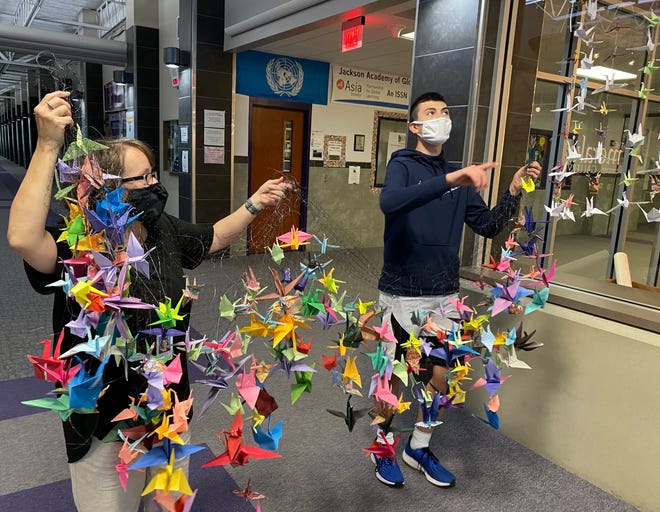
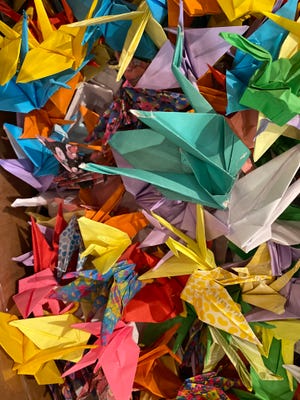
Jackson School
for the Arts,
OH - Innovative Ed Program includes Sadako's Story - A
Thousand Cranes
Visitors often
place brightly colored origami cranes there in memory of Sasaki.
Jackson School for the Arts is sending many of the cranes students
made to the monument.
'We
did not know some of these things'
Freshmen
students led the curriculum-based endeavor, with guidance and support
from teachers in the corresponding courses. Upperclassmen were also
invited into the Meraki Gallery to make cranes while learning the
historic significance. The gallery is part of the Jackson School for
the Arts.
"I got
really excited," Walter said of the project. Walter said
through the experience he learned how to more effectively collaborate
with other students.
Most impactful
was learning the story of Sasaki. Walter, 15, said it taught him
about different cultures and how fortunate students like him are in
the Jackson Township community.
"We did
not know some of these things that happened in some of these other
countries," he said.
Project-based
learning
The overall
effort, an example of project-based learning, broke down like
this: World History class studied World War II and learned
about the crane tradition.
Theater
students studied the play, "A
Thousand Cranes," (Kathryn Schultz Miller - ArtReach
Children's Theatre Plays) and learned Sadako's story.
English
students wrote more than 1,000 messages of hope, love and positivity.
Visual arts
students folded all of the messages into more than 1,400 paper cranes.
Theater
students hung up the cranes and set up a presentation in the Meraki Gallery.
The gallery
exhibit also included a video component created by students with an
interest in film.
"Art
can serve as a vehicle for other subjects."
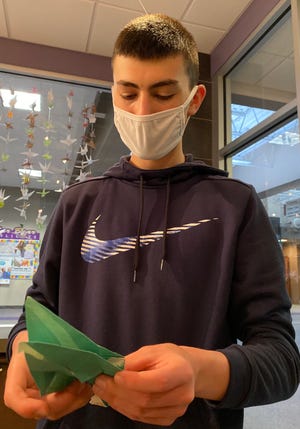
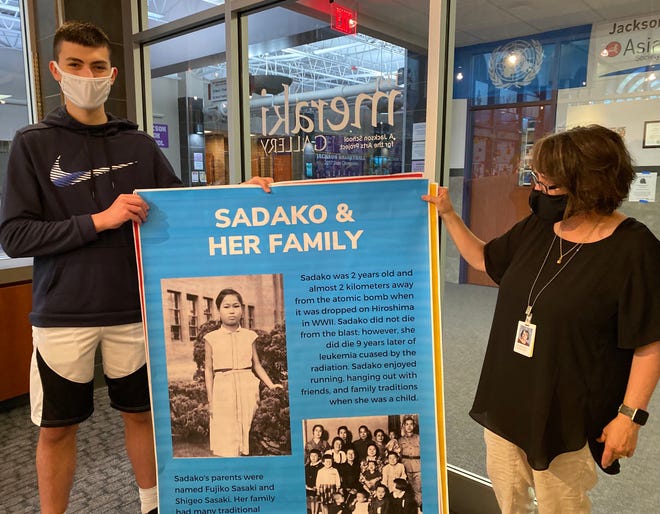
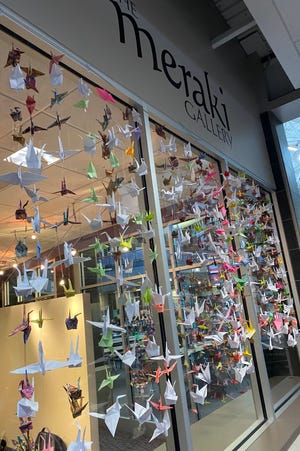
Jackson School
for the Arts,
OH - Innovative Ed Program includes Sadako's Story - A
Thousand Cranes
"Keeping
history alive''
Participating
faculty included Hannah Rissler, theater director; Kim Germano, world
history teacher for freshmen in the School for the Arts; Ryann
Despot, language arts teacher for freshmen in the School for the
Arts; and Sara Andes and Lisa Ayres, visual arts educators.
"Everything
we do in the academy, we put not only an emphasis on the arts, but
student-driven arts," Rissler said. Art can serve as a
vehicle for other subjects, she said. "Art doesn't always
have to be for entertainment," Rissler said. "It can be for
social change and education."
Added Germano:
"This is teaching people about people."
Despot said
students learn better with a personal connection to classroom material.
"When
they relate to the content, they're more likely to learn the
content," she explained. "I think there's something
super powerful about keeping history alive."
Children's
Theatre Organizations
Groups
supporting arts and theatre for young audiences
Children’s
Theatre Foundation of America (CTFA)
CTFA
is committed to the values of diversity, equity and inclusion by
supporting theatre artists and organizations that share these values
working to address past and current injustices to groups that have
been historically disadvantaged and socially, politically, and
economically excluded.
American
Alliance for Theatre & Education (AATE)
AATE
serves and inspires a growing collective of theatre artists,
educators, and scholars committed to transforming young people and
communities through the theatre arts.
Association
for Theatre in Higher Education (ATHE)
ATHE
serves as an intellectual and artistic center for producing new
knowledge about theatre and performance-related disciplines, linking
with theatres, and promoting access and equity.
International
Assoc. of Theatre for Children & Young People
ASSITEJ
unites theatres, organisations and individuals throughout the world
who make theatre for children and young people.
Australian
Children's Theatre Foundation (ACTF, AU)
ACTF
supports delivery of arts-based programs into primary schools across
Victoria, plus subsidy opportunities for remote, regional and
disadvantaged schools and the commissioning of new works for young
people ages 6-11.
Performing
Arts and Young People in Aotearoa (PAYPA, NZ)
PAYPA
is a network of performing artists and organisations working for
children and young people in Aotearoa, New Zealand.
Action
for Children’s Arts (ACA, UK)
ACA
campaigns for children across the UK to have access to the
arts. ACA considers it is essential that the voices of children
should not be excluded from the national conversation.
Youth
Theatre Journal (YTJ)
The
journal focuses on the dissemination of ideas relating to practical
and theoretical developments in the field of theatre and performance
by, with, and for children and youth and drama/theatre education.
National
Youth Theatre (NYT, UK)
NYT
gives young people the opportunity to learn as much about themselves
and how to relate to others, as they do about acting and technical theatre.
Drama
South Australia (DSA, AU)ArtsEdge:
K-12 Resources (AU)
DSA
promotes Drama in education as a valuable and valued part of
education, as well as encourages the study and development of Drama
in education as a teaching methodology and as a creative and
expressive art form.
The
Puppetry Home Page
The
Puppetry Home Page is a free resource for the puppetry community and
is dedicated to helping people connect with the world of puppetry.
Funding
Programs for Theatre Artists & Educators
Lin
Wright Professional Teaching Grant
Supports
the work and professional development of an exemplary secondary
school teacher through the introduction of AATE’s national
professional network.
The
Don and Elizabeth Doyle Fellowship
This
award is given to an outstanding graduate-level student of
demonstrated artistic ability in the area of Theatre for Youth.
The
Winifred Ward Scholarship
The
tuition award of $10,000 is given to a graduate student who has
demonstrated intellectual and artistic excellence in the area of
child drama/theatre.
Children's
Theatre Scholarships (NZ)
New
Zealand's Court Theatre is offering scholarships for Maori and
Pasifka in performance, actng, drama, theatre, creatve writng,
improvisaton and story telling. Interested? Get in touch!
AATE
College/University/Research Experts List
These
AATE members are available for information and advice on their
specialties. Feel free to contact them with your questions. All
AATE members are welcome to join this list which is curated by the
College/University/Research Network.
Sally
Bailey
Professor,
Drama Therapy / Theater
Kansas
State University, Manhattan, KS
AREAS
OF SPECIALIZATION: Drama Therapy, Playwriting, Creative Drama, Puppetry
Work
website: https://www.k-state.edu
Personal
website: https://www.dramatherapycentral.com
Katie
Dawson
Ass't
Professor, Arts Integration and Teaching Artist Pedagogy and Practice
University
of Texas at Austin
AREAS
OF SPECIALIZATION: Arts Integration, Drama-Based Pedagogy and
Practice, Applied Drama/Theatre, Museum Theatre,
Theatre-in-Education, Drama-in-Education, Research Methods, Teaching
Artist Pedagogy and Practice, Professional Learning Models
Work
website: https://theatredance.utexas.edu/
Emily
Freeman
Community
Engagement Director
Orlando
Repertory Theatre in partnership with University of Central Florida (UCF)
AREAS
OF SPECIALIZATION: Community-Based Work, Applied Theatre, and Playmaking
Work
website: https://www.orlandorep.com
Jennifer
Katona
Director
Graduate Program in Educational Theatre
The
City College of New York
AREAS
OF SPECIALIZATION: Curriculum Development in the Arts, Educational
Policy, Directing and Choreography with Youth and Arts Integration
Work
website: https://www.ccny.cuny.edu/edtheatre/
Linda
Krakaur
Instructor/Project
Manager
University
of Maryland, College Park
AREAS
OF SPECIALIZATION: Drama in education, arts integration, arts and
equity, literacy, professional development, school partnerships,
international programs
Work
website: https://education.umd.edu/
Matt
Omasta, Ph.D.
Director
of Theatre Education
Utah
State University
AREAS
OF SPECIALIZATION: Theatre for Young Audiences, K-12 Theatre
Education, Drama Across the Curriculum
PROFESSIONAL
WEBSITE: https://www.mattomasta.com
Roxanne
Schroeder-Arce
Assistant
Professor, Theatre Studies / Theatre Education
Univ
of Texas, Austin
AREAS
OF SPECIALIZATION: Culturally Responsive Theatre Education;
Cultural, Racial, Ethnic representation in TYA
Work
website: https://www.utexas.edu/finearts/tad/people/schroeder-arce-roxanne
Personal
website: https://www.roxannearce.com
Johanna
Smith
Professor,
Theatre Education
California
State University, San Bernardino
AREAS
OF SPECIALIZATION: Puppetry, Improvisation, Creative Drama, Service
Learning in TYA
Work
website: https://theatre.csusb.edu/
Personal
website: https://www.professorjohanna.com
Elena
Velasco
Graduate
Assistant and Instructor, Theater
Catholic
University of America, Washington, DC
AREAS
OF SPECIALIZATION: Directing, Choreography, Physical Theater,
Musical Theater, Improvisation, Creative Drama, Theater Outreach
Personal
website: https://www.elenavelasco.net
Amanda
Wager
Assistant
Professor, TESOL
Lesley
University, Boston, MA
AREAS
OF SPECIALIZATION: Drama in Education, Applied Theatre, Popular
Theatre, ESL & Bilingual Education
Work
website: https:/w.lesley.edu/faculty/amanda-wager/
Personal
website: https://lesley.academia.edu/AmandaCWager
Books
on Creative Drama & Children's Theatre
Easily search
for these books on the Internet
Creative
Drama for the Classroom Teacher
Ruth Beall Heinig.
Prentice-Hall, Inc., 1993.
A college textbook for
Creative Drama teachers. Using straightforward language and clear
descriptions of actual lessons, this book will get you started really
teaching Drama in the classroom. Search
for this book...
Creative
Drama Resource Book
for Grades K-3
Ruth B. Heinig. Prentice-Hall,
Inc., 1987.
Real lessons direct from the
classroom. The focus here is on practice, not theory. You can
immediately TEACH the lessons and activities in this book. Very clear
explanations and easy reference. Search
for this book...
Creative
Drama Resource Book
for Grades 4-6
Ruth B. Heinig and Ruth M. Heinig.
Prentice-Hall,
Inc., 1987.
Real lessons direct from the
classroom. The focus here is on practice, not theory. You can
immediately TEACH the lessons and activities in this book. Very clear
explanations and easy reference. Search
for this book...
Drama
with Children
Geraldine Brain Siks. Harper
and Row, 1983.
Another college textbook for
Creative Drama teachers. A little old-fashioned, but very easy to
follow, with lots of practical lessons. Search
for this book...
Improvisations
in Creative Drama
Betty Keller. Meriwether
Publishing Ltd., 1987.
A collection of Creative Drama
lessons, enough for at least a year's work. The focus is mainly
Theatre training and process-oriented work. If you're looking for
ready-made lessons that WORK, this book has them. Search
for this book...
Drama
Themes:
A Practical Guide for Teaching Drama
Larry Swartz. Heinemann
Educational Books, Inc., 1988.
An excellent text to help you
construct Drama lessons to support a wide variety of themes and
curricular areas. Includes actual, useable lessons. Its strength is
how Swartz makes Drama out of subject matter. Search
for this book...
Theatre
Games for Young Performers
Maria C. Novelly. Meriwether
Publishing Ltd., 1985.
A collection of classic
theatre games for teens. All the activities are intended to train
young actors in performance technique. Lots of fun. Search
for this book...
Structuring
Drama Work:
Available Forms in Theatre and Drama
Jonothan Neelands. Cambridge
University Press, 1992.
An absolutely
information-packed book discussing and contrasting conventions and
approaches to the teaching of drama. Contains lots of useful
activities-mostly appropriate for older kids. Search
for this book...
Children's
Theater: A Paradigm, Primer and Resource
Kelly
Eggers and Walter Eggers. Scarecrow Press, 2010.
This
work is valuable for those wishing to know more about the importance
and use of theater for children, both educationally and socially.
Search
for this book...
Acting
and Theatre (An Usborne Introduction)
Cheryl
Evans, Lucy Smith. Usborne Publishing, 1992.
Providing
an introduction to theater, this work covers all aspects of the
theatrical world, both creative and technical, including acting, set
design, costumes, and more. Search
for this book...
Forum
Theatre for Children: Enhancing Social,
Emotional and Creative Development
Nick
Hammond. Stylus Publishing, 2015.
This
innovative book illustrates the vital role of drama for young
schoolchildren. A dynamic fusion of theatre and psychology, it
describes each step of the process of Forum Theatre. Search
for this book..
Why
Children's Theater Matters:
The
Impact of the Arts on Young People
"Live
theater, it seems, matters as much as math and reading skills."
By
Kori Radloff, The Rose Theatre, Omaha NE
On
the surface, children's theater seems simple: a few over-the-top
characters, some brightly-colored costumes, a simple plot borrowed
from a children's book and maybe a catchy song or two. It's an hour
spent together as family, then it is back to the "real
world," as the on-stage images fade into a distant memory.
In
reality, studies have found that children's theater has a powerful
impact on children and their development. Studies show that engaging
in imaginative activities like theater fosters increased
intelligence. Seeing the world through a new perspective helps young
minds imagine new worlds, new possibilities, and new ideas. Children
who attend live theater have shown greater tolerance of different
people and ideas, as well as increased empathy for others. They show
a better understanding of reading materials. they view social studies
concepts in a new light as history comes alive in front of their
eyes. Teachers have even found that by incorporating drama activities
in the classroom, their students' math scores have increased. There
is no doubt that theater not only entertains, but also enhances
children's lives in many ways.
Here
are a few excerpts that illustrate the power of children's theater:
From
Education.com:
"Study after study has shown that the arts are more than fluff.
Longitudinal data of 25,000 students involved in the arts, conducted
at UCLA's Graduate School of Education by Dr. James Catterall, shows
that consistent participation greatly improves academic performance
and significantly bumps up standardized test scores. Students who
make time for the arts are also more involved in community service,
and less likely to drop out of school. And we're not just talking
about upper middle class kids. These facts remain, regardless of a
child's socio-economic background.
"Theater
also connects to the importance of reading. A play has the ability
to jump a story off the page and bring it to life. This can be a
revelation to regular bookworms, but also a real boon to reluctant
readers. "Part of it is that what's happening on stage is very
similar, in a way, to the play acting and role playing all children
do. It's live, and good plays are just a little bit 'incomplete', if
you will-they need the audience to complete them, and they change
slightly with the audience. Films, of course, are static," says
Kim Peter Kovac, President of Theatre For Young Audiences/USA
(TYA/USA), a national organization for professional children's theaters.
"While
plays work to jumpstart the imagination, they also lengthen the
attention span. At first, Hartzell says, sitting still in a darkened
room may not feel natural for children. But that's precisely why it's
important. Because TV is such a popular form of entertainment, she
says, kids aren't used to focusing for an hour or an hour and a half.
"Kids today see a new image every 3-4 seconds. They're used to
constant change. And they don't listen as well," she says."
From
The Huffington Post:
"Bill English of San Francisco's SF Playhouse says, theater is
like a gym for empathy. It's where we can go to build up the muscles
of compassion, to practice listening and understanding and engaging
with people that are not just like ourselves. We practice sitting
down, paying attention and learning from other people's actions. We
practice caring.
"Kids
need this kind of practice even more than adults do. This is going
to be their planet and they've got more time to apply that empathy
and make a difference. Buddhist roshi Joan Halifax challenges us to
actively and specifically teach children (and vote for presidents
with) empathy. Why not take your child to the theater to do just that."
From
Medical Daily: "Researchers
measured to see if live theater made students more tolerable of
different people and ideas, as well as better able to read another
person's emotions (empathy). Of course, researchers conceded students
from a drama or advanced English course may have gone into the
experiment already being familiar with plot and characters; same for
those who have read or seen a movie version of Hamlet or A Christmas
Carol before.
"Even
so, "it is very clear that reading or watching movies of Hamlet
and A Christmas Carol cannot account for the increase in knowledge
students experienced by winning the lottery to see the plays,"
researchers explained. "Even when we control for watching the
movie or reading the material for school, the estimated effect of
winning the lottery to see the plays remains basically unchanged,
producing an effect size of 58 percent of a standard deviation for
the treatment group on knowledge of the plot and vocabulary of the
plays. Live theater, it seems, matters as much as math and reading skills."
From
SocialStudies.com: "Creative
dramatics, a highly effective method for integrating arts education
into core curriculum, produces a positive and lasting impact on
student learning, in terms of creative and critical thinking,
language development, listening, comprehension, retention,
cooperation, and empathy and awareness of others. Creative
dramatics not only has the power to bring curriculum to life, but
also to stimulate active involvement in the development of conceptual understandings.
"By
bringing the methods of drama in to their lessons, teachers can turn
their classrooms into exploratory arenas of learning for themselves
and their students. Integrating the arts nurtures global
intelligence, speaks to emotional literacy, fosters innovative
thought processes, and cultivates habits of lifelong learning. In my
own teaching, I find that the more drama activities I am able to use,
the more students understand the concepts we are working on and the
more cognitively and emotionally engaged they are. Using creative
drama is practical and engaging, and it brings the social studies
curriculum to life in very meaningful ways."
From
The Washington Post:
"Instead of art as a stand-alone subject, teachers are using
dance, drama and the visual arts to teach a variety of academic
subjects in a more engaging way.... Educators and artists who are
proponents of the method say it reaches students who might not
otherwise absorb traditional classroom methods.
"Some
children can struggle with math because it's abstract. Children can
get emotionally invested in acting out a story, though, that involves
counting. And they are exceptionally good with imagination, far
better than...adult acting students."
"Deep
arts involvement may help to narrow the gap in achievement levels."


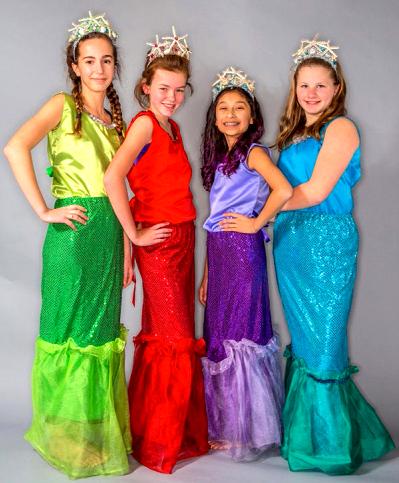
ArtReach's Treasure
Island, Rose Childrens Theatre, Eugene, OR
From
the National Arts Council:
"Students who have arts-rich experiences in school do better
across-the-board academically, and they also become more active and
engaged citizens, voting, volunteering, and generally participating
at higher rates than their peers.
"Socially
and economically disadvantaged children and teenagers who have high
levels of arts engagement or arts learning show more positive
outcomes in a variety of areas than their low-arts-engaged peers. In
middle school, high school, and beyond, they tend to do better on a
host of academic and civic behavioral measures than do at-risk youth
who lack deep arts backgrounds. To varying degrees, those outcomes
extend to school grades, test scores, honors society membership, high
school graduation, college enrollment and achievement, volunteering,
and engagement in school or local politics.
"At-risk
teenagers or young adults with a history of intensive arts
experiences show achievement levels closer to, and in some cases
exceeding, the levels shown by the general population studied. These
findings suggest that in-school or extracurricular programs offering
deep arts involvement may help to narrow the gap in achievement
levels among youth..."
From
AmericansForTheArts.org:
"Data from The College Board show that in 2014, students who
took four years of arts and music classes while in high school scored
an average of 96 points higher on their SATs than students who took
only one-half year or less.
"The
College Board...recommends that education stakeholders consider arts
requirements for high school curricula, high school graduation
requirements, and college and university admission requirements in
the arts.
"Students
with four years of art and music classes averaged 523 on the Writing
portion of the test - 57 points higher than students with one-half
year or less of arts and music classes, who averaged 466 points."
From
National Assembly of State Arts Agencies: "In
a well-documented national study using a federal database of over
25,000 middle and high school students, researchers from the
University of California at Los Angeles found students with high arts
involvement performed better on
standardized
achievement tests than students with low arts involvement. Moreover,
the high arts-involved students also watched fewer hours of TV,
participated in more community service and reported less boredom in school.
Hats
off to the Rose! About The Rose Theatre Omaha: The
Rose Theater is one of the largest and most accomplished children's
theaters in the nation, with a reputation for enriching the lives of
children and families through top-quality professional productions
and arts education. In 2016, American Theatre magazine named The Rose
one of the 20 top children's theaters in the United States. The Rose
is committed to making the arts accessible to all children, providing
opportunities for thousands of children throughout the community to
attend shows and participate in classes each year.
Over
the course of a year, approximately 70,000 people attend the public
performances held at the theater, and nearly 30,000 students attend
field trip shows annually. The theater strives to introduce young
people to a mix of both traditional favorites and ground-breaking
original productions. A number of plays and musicals have made their
world premiere on The Rose stage, including Pete the Cat: The
Musical, Sherlock Holmes & the First Baker Street Irregular, Zen
Ties, Buffalo Bill's Cowboy Band, and The Grocer's Goblin & The
Little Mermaid. We take pride knowing that The Rose is the place
where children of all ages experience theater for the first time, and
we are dedicated to helping them appreciate theater for a lifetime.
How
the Performing Arts Benefit Kids
Kids
who perform gain skills that extend far beyond the standing ovation.
By
Julia Savacool, Scholastic
It's
no big secret that getting kids involved in the performing arts can
have major payoffs in school. After all, research shows that children
who sing/dance/act/play their little hearts out are four times more
likely to be recognized for academic achievement compared with their
non-performing friends - and they tend to have enhanced cognitive,
motor, and social development to boot. But the benefits don't end
there. Getting up on stage can enrich your child's life in all sorts
of surprising ways.
Kids
Who Perform Are Quick Thinkers: Whether
you're a kid or an adult, the ability to stay calm and carry on is
what keeps a small blooper from mushrooming into a major one.
"When something goes wrong during a show, kids learn to
improvise," says Brian Olkowski, a 4th- and 5th- grade teacher
in San Ramon, CA, and director of the school's drama club. "One
of the best things kids discover is how to think on their feet."
No performance is ever perfect, says Olkowski, so the real skill is
learning to minimize errors and get back on track. "When someone
flubs a line, the other kids learn how to cover for him," he
says. "I tell them it's not about never making a mistake; it's
about never letting the audience see your mistake. Those are great
skills that transfer to the classroom setting as well, whether it's
giving a presentation in front of peers or being called on to answer questions."
Still,
it helps to prepare your child for the possibility of problems
cropping up, says Lisa Lollar, Psy.D., a psychologist in Denver, CO,
who works with performing artists. "Talk about what she might do
if she drops her music or forgets a line," says Lollar.
"Working through the scenarios in advance and coming up with a
solution will help her feel prepared if something surprising
happens." The ability to expect the unexpected - and then roll
with it - will give your child confidence any time she tests new
waters. Lollar adds: "If you help your child define success as
being willing to try something new, the idea of messing up isn't so scary."
"You
get to become someone else."
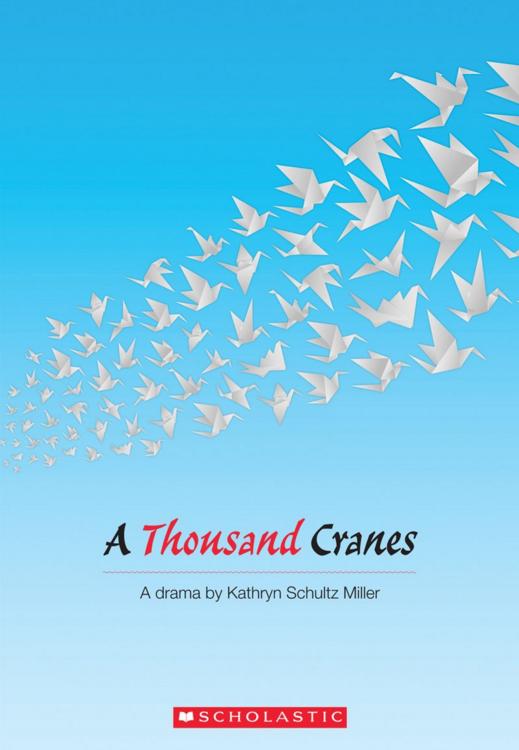
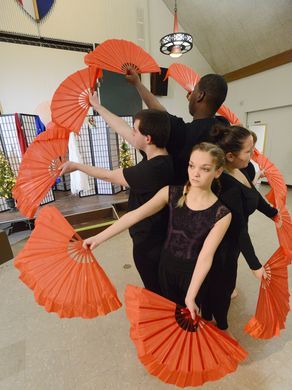
Published by Scholastic -
Centenary Stage Co. NJ
They
Master Their Anxiety: Let's
face it: Even grown-ups get nervous when we have to speak in front
of our colleagues or give a presentation to the boss. Learning from
an early age how to cope with performance jitters gives kids a leg up
in those big life moments. "The first step for a parent is to
normalize a child's feelings of anxiety," says Lollar. "Tell
them, 'You know, a lot of kids - and even adults - feel nervous
before a performance. It's completely natural.'" It won't take
away the nerves, but it will let your child know there's nothing
wrong with feeling this way.
Then
before the big show, talk your child through his worries by
reminding him of other moments when he's felt anxious, even when
things turned out well. "Remind him of the baseball game when he
felt really nervous at the plate, but managed to get a great
hit," suggests Lollar. "Recalling past experiences with
positive outcomes gives a child confidence." Other tricks: Help
your child calm his body in the minutes before the performance begins
by taking four or five long, deep breaths or counting backward from
seven. Both force his mind to focus on something other than his nerves.
Once
the show is over, let your child bask in his accomplishment, then
casually comment on how well everything went. He will carry this
experience with him for the next time, as more evidence that he can
successfully perform under pressure.
Performers
Express Brand-New Emotions: One
of the wonderful things about being in a play is that for a short
period of time, you get to become someone else. For a child who
struggles to talk about her feelings, there is a tremendous relief in
disappearing behind a character and using it as an intermediary
through which to open up. "It is a very safe way for kids to try
out certain feelings - and take ownership of them - while playing the
role of someone else," says Olkowski, who also runs a summer
theater program for children. "I've worked with shy kids who are
able to blossom on stage and express themselves in a way they aren't
comfortable doing around their peers."
Playing
the role of someone else also teaches kids about empathy. "They
learn to put themselves in someone else's shoes," says Jessica
Hoffman Davis, author of Why Our Schools Need the Arts. "In
performing the part of someone else, they learn what it's like to
think like that other person."
Parents
can also use a child's theater performance to open a dialogue about
sensitive issues. "Take the experience of a character in the
play and tie it to your child's situation," says Lollar. "If
your child is nervous about her first day of school, it helps to
say, 'Remember when you were in that play, and the character Lucy was
scared? How did she handle it? What was she feeling? Did it work out
OK for her?' Drawing parallels to the character's situation and her
own will make your child more comfortable talking about her feelings."
For
kids who aren't into acting, dance can offer another way to explore
their interior world, says Annie Spell, Ph.D., a child psychologist
in Lafayette, LA, and co-creator of Leap 'N Learn for the Classroom,
a movement program for kids. "Dance teaches kids to think in a
totally different way. You take the physiological experience of an
emotion and assign it a corresponding movement instead of a word. It
can be a powerful tool for kids who have trouble expressing themselves."
Their
Self-Esteem Can Soar: There's
nothing quite like hearing a crowd of total strangers laugh at your
joke or applaud your double pirouette to make you feel like a star.
"Hearing the audience clap at the end of the show is an
incredible feeling," says Olkowski. "The kids are like,
'Hey, this is for me!' That instant positive feedback is really rewarding."
But
it's more than just the ego boost from the fans - any type of
performance requires teamwork to succeed. "Kids are introduced
to the notion of an ensemble," says Davis. "It's not just
you up on stage. You are responsible for a larger group that is
counting on you to do your part so they can do theirs." That
weight of personal responsibility is rare in a child's world, and
successfully delivering his lines or hitting the right guitar chords
means more because of what's at stake.
"During
a performance, kids become part of a larger system, working toward a
common goal," adds Spell. "It is the culmination of weeks
of practice, so the performance itself becomes the reward for all
that work." Although a positive performance will give your child
a self-esteem injection, it's important to put the emphasis on
effort, rather than results. "Every child will fail at some
point," notes Spell. "But if they judge themselves on
putting their best effort forward and not on being perfect, the
experience can still feel rewarding."
Performers
See the World in a Whole New Way: At
the end of the day, the transferable skills a child learns from
performing may not be nearly as important as the experience of
performing itself. "We're always looking for ways the arts can
benefit kids in other areas of life," says Davis. "It's as
if art for art's sake isn't worth our time, when in fact, it gives
kids an awareness about themselves and creative skills they'd never
learn otherwise." She may never apply the improvisation skills
she learned during the school play to a math equation or turn her
teamwork with other dancers into leadership on the school playground.
But simply by having been part of the performance process, your child
has been exposed to a new way of thinking and doing. And that alone
is a success to be proud of.
All
Free Resources
